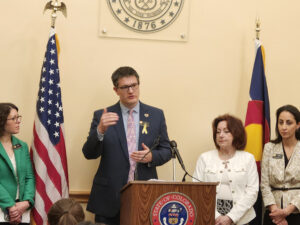As of today, there is only one week left in Colorado’s 2025 legislative session. That’s the good news.
The number of bills important to the business sector that remain unresolved — both proposals that have the community on the defensive and those it supports — borders on daunting for the short amount of time legislators still have to debate them. Those include both business-criticized bills that were introduced on the first day of the session and late-session efforts at regulatory and tax relief that still have numerous hurdles steps to clear.
The next seven days will be long and will be filled with committees meeting simultaneously; seven Senate committees are scheduled to meet at some point today alone. Keeping up with all the bills will be difficult.
With that in mind, here is an overview of the biggest business-focused legislative measures that have yet to be resolved and of where they stand. The Sum & Substance will do the best it can to cover these throughout their most important steps before the mandated May 7 adjournment of the legislative session.
Two major labor requests remain unresolved

State Sen. Jessie Danielson draws applause from union members as she discusses a proposed change to the Colorado Labor Peace Act at a news conference in November. Danielson and Senate Majority Leader Robert Rodriguez are co-sponsors of Senate Bill 5.
Despite being the first bill to receive a hearing in a Senate committee this year, Senate Bill 5, which seeks to overhaul Colorado’s Labor Peace Act by eliminating the mandatory second unionization election needed for union security, still awaits debate in the House. Negotiations are ongoing between union proponents and business opponents, and Gov. Jared Polis’ office is very active in trying to find a consensus; the bill will come to a head by Wednesday, but its final details remain in the air.
Another first-day labor-priority bill, House Bill 1001, which seeks to crack down on wage theft by making it easier for alleged victims to take legal action against employers, is only now scheduled for full debate before the Senate after passing the House. Sponsors and business groups have been trying to work out differences on important provisions like the bill’s assumption of retaliation if complainants are disciplined, but the measure will get a final vote whether or not any compromise is reached.
One of the session’s most contentious topics — whether the state should step in to preserve hospitals’ full access to the federal 340B discount drug-pricing program in the face of calls for reform from pharmaceutical manufacturers — is unresolved, with competing bills from the two interest groups both still alive. After lengthy hearings in the House Health and Human Services Committee late Wednesday, both bills are expected to get votes in the coming days, and many believe legislators must pick just one to advance.
Legislative debate on key health, tax issues continues

Colorado state Rep. Kyle Brown, surrounded by supporters, unveiled a bill in February that would cap some reimbursements for hospital services.
Several other controversial health-care bills have decidedly unknown paths to Polis’ desk, including stalled efforts to cap some hospital reimbursement rates and to raise a fee on private insurance policies that helps to subsidize several state programs. A bill to reform the state’s regulation of pharmacy-benefit managers is in better shape to get approval by Wednesday, while a heavily amended bill that now requires only large-group health plans to provide special anti-obesity coverage may or may not have the support to pass.
A highly anticipated bill to rewrite Colorado’s groundbreaking regulation of artificial intelligence received introduction only this week and has yet to be scheduled for its first committee hearing as industry leaders prepare a slew of proposed amendments. But it’s likely to take up significant legislative time in the next week, particularly as Polis vowed last year to fix the regulatory framework before it is set to take effect in February.
A bill to provide special protections to whistleblowers in the AI sector, which concerned both industry leaders and Polis, appears to have little pathway to becoming law, as it’s idling on the House calendar. Several other bills appear stuck even earlier in the process in the House Appropriations Committee, including a business-backed measure to consider the impact of environmental rules on job creation and a business-opposed measure to make companies publicly list their greenhouse-gas emissions.
Two long-stalled tax-incentive bills — one to reauthorize the advanced-industries tax-credit program and the other to expand tax benefits for businesses converting to employee ownership — have sprung back to life in the past week and appear on track to passage. But a proposal to create a new tax-incentive program to attract capital-intensive data centers has fallen off the calendar since getting its first committee approval on April 16, leaving its chances for advancement looking dimmer.
Polis’ decision will be key on several proposals

Gov. Jared Polis speaks to the Colorado Chamber of Commerce board meeting on April 24.
A regulatory-reform effort from the Colorado Chamber of Commerce to require performance audits of key state agencies is moving quickly now after a pair of consensus-generating amendments. But another effort from the chamber, seeking to require more transparency of third-party lawsuit funding by foreign entities, still awaits its first scheduled Senate committee hearing after blowing through the House.
Final legislative concurrence votes await an effort to bolster the ability of persons with disabilities to sue companies that violate anti-discrimination statutes and a bill to expand doctor choice for injured workers. A gutted bill that sought to roll back insurance-sector and enterprise-zone tax breaks needs several final votes in the Senate, while a bill to require new safety protocols of transportation-network companies like Uber and Lyft faces strong opposition from the companies as it needs two more affirmative votes in the Senate.
Several bills are on their way to Polis and await his final decision. Those include a request to study potential conversion to a single-payer healthcare system, a tamped-down bill to strengthen Colorado’s price-gouging laws and a plan to reform construction-defects law.
Buckle in and stay tuned.
